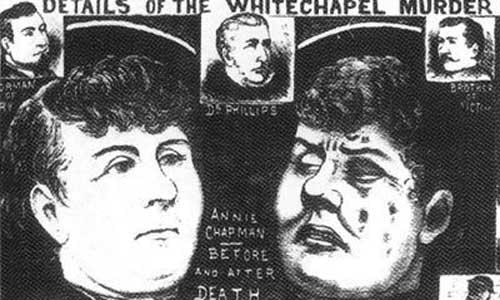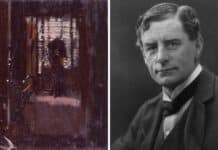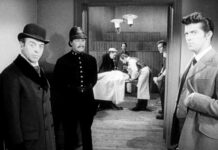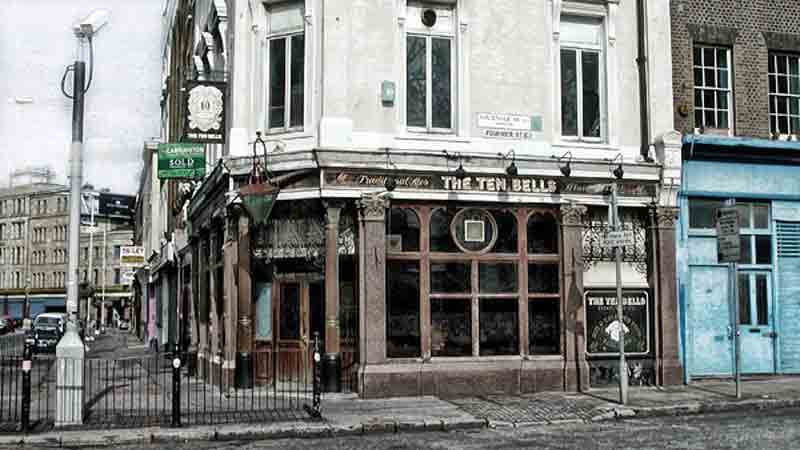Ripperologist JON REES looks at the killing of Jack the Ripper’s second victim, Annie Chapman on 8th September 1888

8th September 1888, 6am
John Davis, one of residents of number 29 Hanbury Street entered the backyard of the house he shared with 16 other people when he discovered the backdoor open.
Davis had had a restless night, having been awake for most of it and had been walking back and forth for several hours.
The sight that greeted him when he entered the yard would probably ensure many more restless nights of sleep, for he found the second victim of the killer who would become known as Jack the Ripper, 47 year old Annie Chapman dead at the foot of the steps into the yard.
Her throat had been cut and she had been disembowelled.
Who was Annie Chapman?
Annie was a casual prostitute and an alcoholic like the previous victim who lived in a common lodging house on Dorset Street.
Hours before her death, Annie was drunk and turfed out onto the street after not being able to pay her doss money for her bed – no doubt she then took to the street to find a client so she could afford her bed for the night.
Her friend Elizabeth Long claims to have seen Annie approximately half an hour before her body was discovered, standing outside 29 Hanbury Street with a man.
She overheard the man ask “will you?” and Annie answer “yes”.
In all probability Elizabeth Long witnessed Annie Chapman standing there with her killer – the elusive Jack the Ripper.
Not long after Albert Cadosch, a resident of 27 Hanbury Street (the property next door) went into his backyard and passed the fence that bordered 29. He heard a woman say “no” and something heavy fall against the fence.
Davis ran out of 29 Hanbury Street and alerted two strangers in the street who went to see the body for themselves. Davis himself headed to Commercial Street police station.
The police summoned Dr George Bagster Phillps who later testified the following at the inquest into Annie Chapmans death:
“The left arm was placed across the left breast. The legs were drawn up, the feet resting on the ground, and the knees turned outwards. The face was swollen and turned on the right side. The tongue protruded between the front teeth, but not beyond the lips. The tongue was evidently much swollen. The front teeth were perfect as far as the first molar, top and bottom and very fine teeth they were. The body was terribly mutilated…the stiffness of the limbs was not marked, but was evidently commencing. He noticed that the throat was dissevered deeply.; that the incision through the skin were jagged and reached right round the neck.. On the wooden paling between the yard in question and the next, smears of blood, corresponding to where the head of the deceased lay, were to be seen. These were about 14 inches from the ground, and immediately above the part where the blood from the neck lay.
“He should say that the instrument used at the throat and abdomen was the same. It must have been a very sharp knife with a thin narrow blade, and must have been at least 6 in. to 8 in. in length, probably longer. He should say that the injuries could not have been inflicted by a bayonet or a sword bayonet. They could have been done by such an instrument as a medical man used for post-mortem purposes, but the ordinary surgical cases might not contain such an instrument. Those used by the slaughtermen, well ground down, might have caused them. He thought the knives used by those in the leather trade would not be long enough in the blade. There were indications of anatomical knowledge…he should say that the deceased had been dead at least two hours, and probably more, when he first saw her; but it was right to mention that it was a fairly cool morning, and that the body would be more apt to cool rapidly from its having lost a great quantity of blood. There was no evidence…of a struggle having taken place. He was positive the deceased entered the yard alive…
A handkerchief was round the throat of the deceased when he saw it early in the morning. He should say it was not tied on after the throat was cut.”
In his post mortem report he also noted the following:
“He noticed the same protrusion of the tongue. There was a bruise over the right temple. On the upper eyelid there was a bruise, and there were two distinct bruises, each the size of a man’s thumb, on the forepart of the top of the chest. The stiffness of the limbs was now well marked. There was a bruise over the middle part of the bone of the right hand. There was an old scar on the left of the frontal bone. The stiffness was more noticeable on the left side, especially in the fingers, which were partly closed. There was an abrasion over the ring finger, with distinct markings of a ring or rings. The throat had been severed as before described. the incisions into the skin indicated that they had been made from the left side of the neck. There were two distinct clean cuts on the left side of the spine. They were parallel with each other and separated by about half an inch. The muscular structures appeared as though an attempt had made to separate the bones of the neck. There were various other mutilations to the body, but he was of the opinion that they occurred subsequent to the death of the woman, and to the large escape of blood from the division of the neck.
“The deceased was far advanced in disease of the lungs and membranes of the brain, but they had nothing to do with the cause of death. The stomach contained little food, but there was not any sign of fluid. There was no appearance of the deceased having taken alcohol, but there were signs of great deprivation and he should say she had been badly fed. He was convinced she had not taken any strong alcohol for some hours before her death. The injuries were certainly not self-inflicted. The bruises on the face were evidently recent, especially about the chin and side of the jaw, but the bruises in front of the chest and temple were of longer standing – probably of days. He was of the opinion that the person who cut the deceased throat took hold of her by the chin, and then commenced the incision from left to right. He thought it was highly probable that a person could call out, but with regard to an idea that she might have been gagged he could only point to the swollen face and the protruding tongue, both of which were signs of suffocation.
“The abdomen had been entirely laid open: the intestines, severed from their mesenteric attachments, had been lifted out of the body and placed on the shoulder of the corpse; whilst from the pelvis, the uterus and its appendages with the upper portion of the vagina and the posterior two thirds of the bladder, had been entirely removed. No trace of these parts could be found and the incisions were cleanly cut, avoiding the rectum, and dividing the vagina low enough to avoid injury to the cervix uteri. Obviously the work was that of an expert- of one, at least, who had such knowledge of anatomical or pathological examinations as to be enabled to secure the pelvic organs with one sweep of the knife, which must therefore must have at least 5 or 6 inches in length, probably more. The appearance of the cuts confirmed him in the opinion that the instrument, like the one which divided the neck, had been of a very sharp character. The mode in which the knife had been used seemed to indicate great anatomical knowledge.
“He thought he himself could not have performed all the injuries he described, even without a struggle, under a quarter of an hour. If he had down it in a deliberate way such as would fall to the duties of a surgeon it probably would have taken him the best part of an hour.”
The police manhunt that began during the Nichols murder for the demonic Jewish fiend the press dubbed “Leather Apron”. John Pizer, a man locally known as Leather Apron who had a reputation for mistreating prostitutes was arrested, but later released after having a cast iron alibi and appearing at the Chapman inquest to clear his name. What would happen next would immortalise the fiendish killer and give him the name we know a century later – Jack the Ripper.







